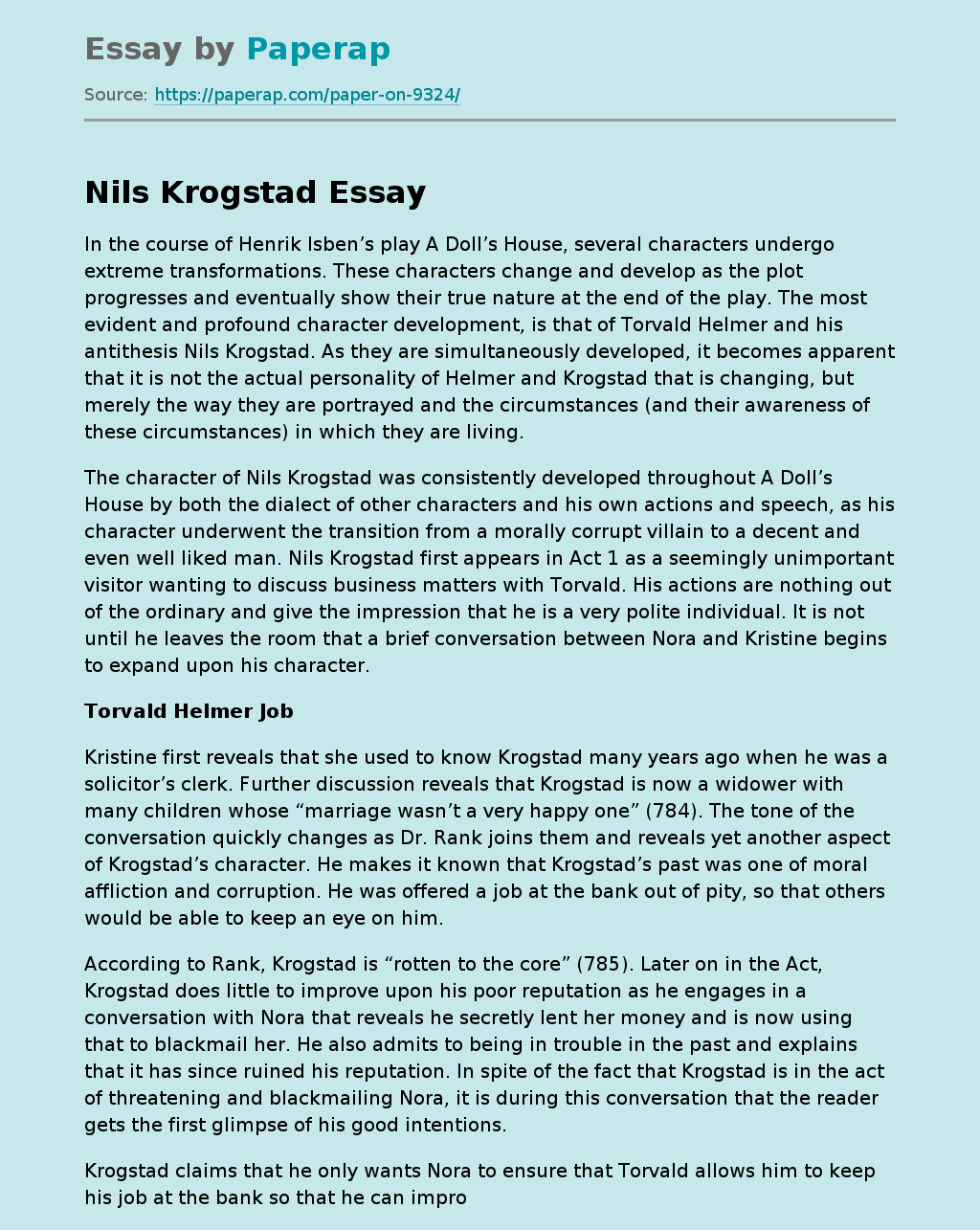Torvald Helmer Job
In the course of Henrik Isben’s play A Doll’s House, several characters undergo extreme transformations. These characters change and develop as the plot progresses and eventually show their true nature at the end of the play. The most evident and profound character development, is that of Torvald Helmer and his antithesis Nils Krogstad. As they are simultaneously developed, it becomes apparent that it is not the actual personality of Helmer and Krogstad that is changing, but merely the way they are portrayed and the circumstances (and their awareness of these circumstances) in which they are living.
The character of Nils Krogstad was consistently developed throughout A Doll’s House by both the dialect of other characters and his own actions and speech, as his character underwent the transition from a morally corrupt villain to a decent and even well liked man. Nils Krogstad first appears in Act 1 as a seemingly unimportant visitor wanting to discuss business matters with Torvald.
His actions are nothing out of the ordinary and give the impression that he is a very polite individual. It is not until he leaves the room that a brief conversation between Nora and Kristine begins to expand upon his character.
Kristine first reveals that she used to know Krogstad many years ago when he was a solicitor’s clerk. Further discussion reveals that Krogstad is now a widower with many children whose “marriage wasn’t a very happy one” (784). The tone of the conversation quickly changes as Dr. Rank joins them and reveals yet another aspect of Krogstad’s character.
He makes it known that Krogstad’s past was one of moral affliction and corruption. He was offered a job at the bank out of pity, so that others would be able to keep an eye on him.
According to Rank, Krogstad is “rotten to the core” (785). Later on in the Act, Krogstad does little to improve upon his poor reputation as he engages in a conversation with Nora that reveals he secretly lent her money and is now using that to blackmail her. He also admits to being in trouble in the past and explains that it has since ruined his reputation. In spite of the fact that Krogstad is in the act of threatening and blackmailing Nora, it is during this conversation that the reader gets the first glimpse of his good intentions.
Krogstad claims that he only wants Nora to ensure that Torvald allows him to keep his job at the bank so that he can improve his status. Maintaining that the money is the last thing that he cares about, he states: “my sons are growing up; for their sake I must try to win back what respectability I can” (789). The next section of the play reverts back to degradation of Krogstad’s character as Torvald expresses his opinion of his former friend. Torvald does not sugarcoat his dislike of Krogstad; instead he is quick to disclose Krogstad’s crime of forgery.
He continues by unveiling the fact that rather than admitting his guilt and taking the punishment, Krogstad “dodged what was coming to him by a cunning trick” (793). Torvald insists that a man with a crime like that on his conscience “will always be having to lie and cheat and dissemble” (793) even around his own family. In Torvald’s mind, this makes his former schoolmate morally depraved because he has “been poisoning his own children for years with lies and deceit” (793). Due to all of his above-mentioned opinions, Torvald expresses his annoyance at the fact that Krogstad “thinks he has every right to treat me as an equal” (798).
As the second Act nears its end and the third Act brings the play to a close, Krogstad undergoes his final stages of development. In conversation with Nora he begins to open up and tells her, “even somebody like me has a bit of what you might call feeling” (803). It is also here that one can begin to understand Krogstad’s motives and sympathize with him. He tells Nora: “for the last eighteen months I’ve gone straight; all the time it’s been hard going; I was content to work my way up, step by step” (804). Krogstad then continues to express his dismay at being kicked out again.
Torvald Helmer Job. (2019, Dec 05). Retrieved from https://paperap.com/paper-on-9324/

